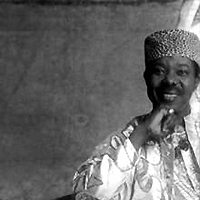 |
King Sunny Ade is the undisputed king of juju music, the dance-inspiring hybrid of western pop and traditional African music with roots in the guitar tradition of Nigeria. Although he's yet to equal the success that he enjoyed with his early-1980s albums and American tours, Ade and his band, His African Beats, continue to weave an infectious blend of electric guitars, synthesizers and multi-layered percussion. Born to a family of Nigerian royalty, Ade left school to pursue a career in music. In the mid-1960s, he performed with a Highlife band, Moses Olaiya's Federal Rhythm Dandies. Ade formed his own band, The Green Spots, in 1967. Frustrated by the exploitation of the record industry, Ade launched his own record label in 1974. In the two and a half decades since, the label has released more than one hundred of Ade's recordings in Nigeria. Ade began to attract attention in the western world when three of his albums — Juju Music, Synchro System and Aura — were released in the early-1980s on the Mango label, a subsidiary of Island Records. Ade and His African Beats made their debut American performances to enthusiastic crowds in 1983. Although Juju Music and Synchro System showed signs that Ade was going up to live up to billing as "the African Bob Marley," Aura was a commercial disappointment and the group was dropped by Island Records. While they released an album, Authority, in 1990, it too failed to stir much commercial interest. E Dide (Get Up), released in 1995, offered hints that the best days of Ade and His African Beats are yet to come. The group followed it with Odu, a collection of ancient Nigerian songs, in 1998; the album was nominated for a Grammy. Its follow-up, Seven Degrees North, appeared in 2000. Ade has remained a powerful force in Nigeria. Money received from his early albums has been used to launch an oil firm, a mining company, a nightclub, film and video production company, a PR firm and a record label specializing in recordings by African artists. It's been estimated than more than seven hundred people are employed by Ade's companies. In the mid-1990s, Ade founded the King Sunny Ade Foundation, an organization that includes a performing arts center, state of the art recording studio and housing for young musicians and performers on a five acre tract donated by the Lagos state government. Ade currently serves as chairperson of the Musical Copyright Society of Nigeria. In 1996, Ade formed a "supergroup", The Way Forward, featuring top-notch Nigerian musicians. Ade and His African Beats have been featured in three films — Juju Music in 1988, Live At Montreux in 1990 and Roots of Rhythm in 1997 |
|